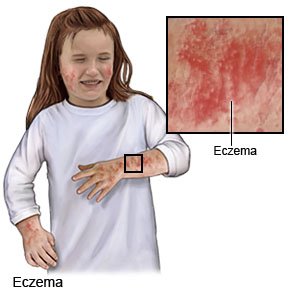Eczema
Medically reviewed by Drugs.com. Last updated on Aug 4, 2025.
AMBULATORY CARE:
Eczema
is an itchy, red, scaly skin rash. You are more likely to have it if a family member has eczema, asthma, or hay fever. Eczema is a long-term condition that often begins in childhood. You may have flare-ups from time to time for the rest of your life.
 |
Signs and symptoms:
- Patches of dry, red, itchy skin
- Bumps or blisters that crust over or ooze clear fluid
- Areas of skin that are thick, scaly, or hard and leather-like
Eczema triggers:
Anything that increases dryness or makes you want to scratch is a trigger. Triggers may cause eczema to flare up. The following are common triggers:
- Frequent hot baths or showers can lead to dry, itchy skin.
- Sudden temperature changes , such as cold air, dries out your skin. Heat can increase sweating. Both can make you itch.
- Allergens such as dust mites and pet dander can make your symptoms worse. Pollen, mold, and cigarette smoke may also irritate your skin.
- Some kinds of soap, makeup, and household cleaners may bother your skin. Ask your provider about mild products you can use that do not contain dyes or fragrances.
- Stress, anxiety, or depression may cause your eczema to get worse.
Seek care immediately if:
- You develop a fever or have red streaks going up your arm or leg.
- Your rash gets more swollen, red, or hot.
Related medications
Treatment options
The following list of medications are related to or used in the treatment of this condition.
Call your doctor if:
- Most of your skin is red, swollen, painful, and covered with scales.
- You develop bloody, painful crusts.
- Your skin blisters and oozes white or yellow pus.
- You have trouble sleeping because of itching.
- You have questions or concerns about your condition or care.
Treatment for eczema
is aimed at reducing pain and itching, and adding moisture to your skin to repair your skin barrier. The skin barrier is the outer layer of your skin. It protects your skin from outside conditions and helps prevent water loss from your body. Your symptoms should improve within several weeks of treatment. You may need the following:
- Medicines may help reduce itching, redness, pain, and swelling. They may be given as an emollient (thick) cream, pill, or injection under the skin. You may also receive antibiotics if you have a skin infection.
- Phototherapy , or light therapy, may help heal your skin.
Care for your skin:
- Pat or press on your skin to relieve itching. Do not scratch. Keep your fingernails short so you do not tear your skin.
- Keep your skin moist. Use gentle or sensitive skin lotion, cream, or ointment many times throughout the day. Ask your healthcare provider what to use and how often to use it.
- Take baths or showers with lukewarm water for 10 minutes or less. Use mild soap or liquid cleanser made for sensitive skin. Apply moisturizer when your skin is damp, right after a bath or shower.
- Wear cotton clothes. Wear loose-fitting clothes made from cotton or cotton blends. Avoid wool, polyester, or other scratchy material.
- Use a humidifier to add moisture to the air in your home.
- Avoid changes in temperature , especially activities that cause you to sweat a lot. Sweat can cause itching. Remove blankets from your bed if you get hot while you sleep.
- Avoid allergens, dust, and skin irritants. Do not use perfume, fabric softener, or makeup that burns or itches.
Follow up with your doctor as directed:
Write down your questions so you remember to ask them during your visits.
© Copyright Merative 2025 Information is for End User's use only and may not be sold, redistributed or otherwise used for commercial purposes.
The above information is an educational aid only. It is not intended as medical advice for individual conditions or treatments. Talk to your doctor, nurse or pharmacist before following any medical regimen to see if it is safe and effective for you.
Learn more about Eczema
Treatment options
Care guides
Symptoms and treatments
Medicine.com guides (external)
Further information
Always consult your healthcare provider to ensure the information displayed on this page applies to your personal circumstances.
